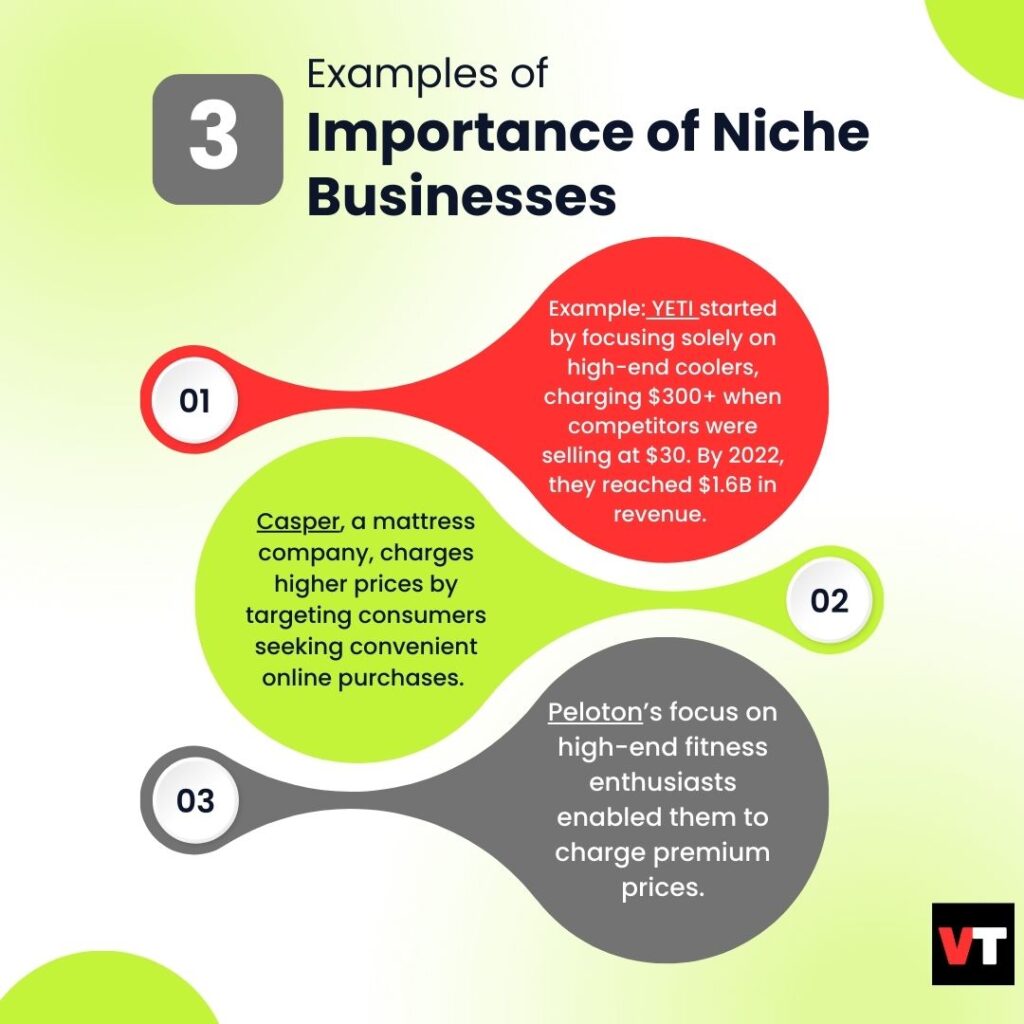Niche research helps entrepreneurs identify underserved market segments, reduce competition (as we target a specific industry), and build expertise. It enables targeted marketing, higher conversion rates, and better ROI in any sort of business you run. Niches businesses can meet specific customer needs by creating personalized solutions, targeted advertising, and establishing authority in their market.
When I started my blogging business in 2013, I started with a niche like Textile Technology (as I was studying Texting Engineering at that time) and my very first blog was a massive success just because of the niceness it has.
So, niche research is important mainly because:
- Specialization Increases Credibility: Focusing on niches builds authority and customer trust.
- Higher Engagement & Conversions: Targeted offerings come with personalized offers and language for a very specific audience, which always drive better results.
- Easier Marketing & Scaling: There are always the scope for Niche businesses to expand into related markets while retaining loyal customers at the same time.

10 Benefits of Niche Research with Real Examples
Higher and Better Profit Margins
Example: YETI started by focusing solely on high-end coolers, charging $300+ when competitors were selling at $30. By 2022, they reached $1.6B in revenue by dominating the premium outdoor equipment niche.
Casper, a mattress company, charges higher prices by targeting consumers seeking convenient online purchases.
Peloton’s focus on high-end fitness enthusiasts enabled them to charge premium prices.
So, its always the personalized niche solutions that make the most money in businesses these days.
Reduced Marketing Costs
Dollar Shave Club focused exclusively on men’s razors initially, spending 90% less on customer acquisition compared to broad-market competitors like Gillette. This led to their $1B acquisition by Unilever.
Thinking different with an unique offering by DollarShaveClub did that trick. A niche at its best.
Enhanced Customer Loyalty
Example: Peloton focused on luxury home fitness equipment, achieving a 92% annual retention rate compared to the industry average of 72% for regular gyms.
Chobani Yogurt builds loyalty by catering to health-conscious consumers.
Easier Market Dominance
Spanx started by focusing solely on footless pantyhose, becoming a billion-dollar company by dominating this specific niche before expanding.
Here is another example Idea to look at: a local gluten-free bakery grew faster than general bakeries by meeting a specific dietary need.
BarkBox, a subscription box for dog lovers, succeeded by narrowing its audience to pet owners passionate about canine care and they clearly dominated the canine care industry.
Better SEO Performance
Backlinko focused purely on SEO content, achieving 4x higher engagement rates than competitors who covered general digital marketing topics.
Google loves niches as niche website or business or product always showcase expertise and authority as all the articles of a website are written based on a single industry.
Stronger Brand Recognition
Blue Apron initially focused only on meal kits for health-conscious young professionals, reaching $795M in revenue before expanding to other segments.
So if you just talk about Meal Kits Blue Apron always comes first in your mind no matter you like them or not.
Effective Product Development
Example: Allbirds focused solely on sustainable wool sneakers, growing to $277M in revenue by 2021 through deep understanding of eco-conscious consumers.
Single parent dating sites create supportive environments and niche brands just can focus on producing dating products or info journals for single parents only.
Higher Customer Lifetime Value (CLTV)
Example: Chewy.com focused on pet supplies, achieving a 120% customer lifetime value increase compared to general retailers selling pet products.
Coursera instructor Josh Portilla focused solely on Python programming for data science, generating $2.5M in revenue compared to general programming instructors averaging $180K.
Improved Customer Service
Warby Parker focused on prescription glasses direct-to-consumer, achieving 85% customer satisfaction compared to 65% for traditional retailers.
When you go for a niche, you always have better idea of your customers than the competitors who serves same thing to all kinds of people. You always win here.
Better Word-of-Mouth Marketing
TheRealReal focused exclusively on luxury consignment, growing through word-of-mouth to $468M in revenue by 2021.
WebFX specialized in healthcare digital marketing, achieving 93% client retention versus the industry average of 44%.
So, when anyone from the health industry wants to have a marketing services, they directly go to WebFX due to their specific expertise on this specific field.
Successful Niches from Different Online Businesses with Examples
You should follow these businesses to understand why you should always think about niches or how important it is to pick a specific sector of a broader industry when you start your next business.
- Fitness Equipment Retailers: Focusing on niche fitness equipment, like what Peloton did with their stationary bikes, allows businesses to match up with specific fitness enthusiasts and create a loyal customer base.
- Pet Care Services: Businesses like Petco just skyrocketed their profits to moon by offering specialized pet care products and services, appealing to pet owners looking for high-quality care. They didn’t want to target all the pet owners of the world, instead they focused to the owners who just want high quality and top-notch care.
- Travel Agencies: Niche travel agencies, such as Intrepid Travel, focus on adventure travel, attracting travelers seeking unique experiences. You can’t be successful building another Tripadvisor.
- Health and Wellness Apps: Apps like Headspace focus on meditation and mindfulness, targeting users interested in mental health and well-being.
- Sustainable Fashion: Brands like Patagonia focus on eco-friendly clothing, appealing to environmentally conscious consumers. Forget H&M and live with Patagonia and that is what I would be proud of. Aren’t you?
- Educational Platforms: Platforms like Coursera offer specialized courses, attracting learners looking for specific skills or knowledge. Pat Flynn’s “Smart Passive Income” podcast focused on online business, earning $2.1M annually compared to general business podcasts averaging $50K.
- Gourmet Food Delivery: Services like HelloFresh focus on meal kits, matching up with home cooks who are looking for convenience and variety.
- Tech Gadgets: Companies like Anker specialize in charging accessories, laser focused for tech enthusiasts needing reliable and innovative products. Its may be just a charger, but see how much impact it just had in the mass people of all over the world.
- Beauty and Skincare: Brands like The Ordinary focus on scientifically formulated skincare products, attracting consumers looking for effective solutions.
- Subscription Box Services: Services like Birchbox offer curated beauty products, targeted to consumers who are looking for personalized and surprise gifts.
- Bloggers & Publishing Business: Niches help bloggers to target a dedicated audience, leading to higher engagement (as the content is more customized and specifically curated for the specific group of people who want specific sort of expertise) and monetization opportunities.
- Ecommerce Businesses: Niches allow ecommerce stores to stand out and cater to specific customer needs, resulting in higher conversion rates. For example, I would love to buy birthday cards from Etsy instead of Amazon.
- Real Estate Agencies: Focusing on niche markets like luxury properties or eco-friendly homes can attract a targeted clientele and enhance the reputation of your business in the real estate world. Its because you are in a niche and you are different.
When Not to Go Niche With Your Businesses?
You should always go for a niche, I know. But still, there are some time (specially when we talk about time, political or financial conditions are applied) when we have to think about niching down twice. Here are some examples:
Market Size Limitations
- When the total addressable market is too small
- Example: A business focusing only on left-handed golf clubs might find growth limitations.
Economic Conditions
- During recession periods when diversification might be safer
- When market conditions favor broader offerings
Resource Constraints
- When you lack expertise in the chosen niche
- When entry costs for the niche are prohibitively high
Market Saturation
- When the niche already has dominant players
- When barriers to entry are too high
Technology Changes
- When technological shifts might make the niche obsolete
- Example: Businesses focusing solely on DVD rentals
When To Consider Going With Broad Categories For Your Business?
There are some exceptions of whatever we told you above about niching down. Sometime, you can start targeting everybodies and everything from start. I mean, you can go super broad with your business at those conditions. Just keep reading and you will get all of these:
You have significant resources and capital.
- Example: Amazon started with books but had the resources to expand
- When you can effectively manage multiple market segments
Market Demand Shows Breadth
- When customer needs span multiple categories
- When cross-selling opportunities are significant
Competition Forces Diversification
- When competitors are squeezing margins in your niche
- When market share is difficult to capture in a single niche
So, that is for today.
If you ask me how important is to go with a niche business? I would say – if you really want to do something different than others, make exclusive product or target ultra-targeted audience who will beg you to buy your product or services; then go for niche businesses. Because, its that much important to start with a big FOCUS on yourself and the businesses. You always can expand later.



